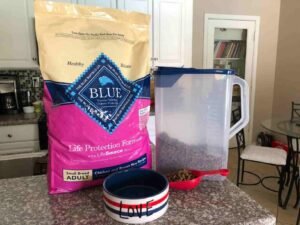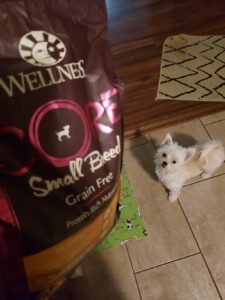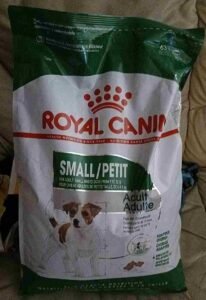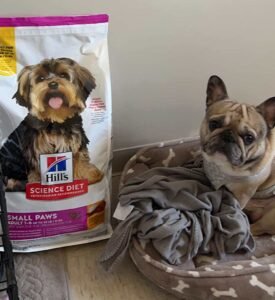Dry Dog Food for Small Breeds: A Complete Guide
Selecting the proper diet is critical for the health and wellbeing of your small breed dog. Little breed dogs have different dietary requirements compared to bigger dogs. Dry dog food is one of the most preferred options for tiny breeds due to its ease of use and health benefits. This article will cover everything you need to know about dry dog food for tiny breeds. It will help you determine what to look for, how to choose the best brands, and how to ensure that your little dog receives the proper nourishment.
Why Dry Dog Food for Small Breeds?
Dry dog food is practical and simple to keep, with a lengthy shelf life, making it a popular choice for many dog owners. This type of food is especially beneficial for tiny breed dogs, who need special nutrition due to their small size and high energy needs. Specifically made with smaller kibble, it’s easier for little dogs to chew and digest.
Further:
Small breed dry dog food is specifically made with smaller kibble, making it easier for little dogs to chew and digest. This is important as larger kibble may be challenging for them to eat.In comparison of, larger dogs, small breeds require more calories due to their rapid metabolism. Therefore, they need a diet that provides them with the energy they require to stay active and healthy.
Benefits of Dry Dog Food for Small Breeds
Dry dog food is the better option for your little breed for a variety of reasons. Here are some main advantages:
Easy to Store
Storing dry food is simple. When kept in a sealed bag, it stays fresh for a long time. Buying in bulk can also help you save money.
Dental Health
Dry food helps keep your dog’s teeth clean. Chewing on the food helps remove plaque, which is especially important for little dogs who are more prone to dental issues.
Portion Control
It’s easy to measure your dog’s intake of dry food, making portion control simple and preventing overfeeding.
Extended Shelf Life
Dry food lasts longer than wet food, giving you more flexibility in your schedule.Moreover, dry dog food formulated for the high energy needs of small breeds provides the right balance of nutrients, keeping your dog active and happy.Switching to dry dog food for your little breed can provide these benefits and more.
Nutritional Needs of Small Breeds
Small breed dogs have particular dietary requirements. They need a certain ratio of nutrients. You should know the following about their nutritional needs:
Moreover , Small breeds require high-quality protein, which is essential for maintaining their muscles. Look for products with actual meat as the first component, such as fish, meat, and chicken.
These dogs also need good fats for energy and to support the health of their coat and skin. Seek out foods high in fatty acids like omega-3 and omega-6.
Vitamins and minerals
Vitamins and minerals are also necessary for small breed dogs. Calcium is essential for healthy bones, while Vitamin E helps maintain a strong immune system. Additionally, Make sure the food you choose has the proper ratio of nutrients.
Tinier kibble is required for tiny dogs because larger kibble can be difficult for them to chew. Smaller pellets are easier to digest, which is why a lot of companies manufacture kibble especially for little breeds.
Avoid meals that contain fillers like wheat or maize because, fillers do not provide many nutrients and may lead to health issues such as weight gain.
To choose the best dry dog food for your tiny breed, you should be aware of these nutritional requirements.
How to Choose the Best Dry Dog Food for Small Breeds
Although , When choosing the finest dry dog food from the many varieties available, consider the following advice to make a wise decision:
Read the Ingredient List
Ensure that you are familiar with the ingredients in the dog food. Look for actual meat as the first ingredient, indicating superior protein.Also, Avoid meals that contain artificial flavors, corn, or soy as the main ingredients.
Verify the size of the kibble to make sure it is suitable for your dog to chew. Smaller breeds may require smaller food specifically made for their size.
Seek Nutritional Balance
Make sure that the levels of protein, fats, and carbohydrates are balanced in the dog food. This will provide your dog with the right amount of energy.
Avoid artificial additives and opt for natural dietary ingredients. Therefore, steer clear of meals containing artificial flavors, colors, or preservatives as natural components are often healthier for your dog.When choosing a brand, make sure to select reputable ones and read reviews from other dog owners to determine the effectiveness of the food for small dogs.
Consider your dog’s individual needs by consulting with a veterinarian if they have any health concerns. They can recommend specific diets tailored to address your dog’s medical requirements.By following the advice in this article, you can select the best dry dog food for your small breed dog and ensure they receive the necessary nourishment.
Popular Brands of Dry Dog Food for Small Breeds
Several companies produce premium dry dog food for tiny breeds. Here are a few well-known options you may want to consider:
Blue Buffalo Life Protection Formula Small Breed
This brand features actual meat as its primary component, along with veggies and healthy grains. The kibble is small and easy for little dogs to chew. Key Benefits: Contains nutritious grains, antioxidant-rich LifeSource Bits, and premium chicken protein. It is excellent for strong muscles and a glossy coat and has no chemical preservatives.
Key Ingredients: barley, brown rice, deboned chicken, and LifeSource Bits, which are high in antioxidants.

| Ingredient | Benefits |
|---|---|
| Deboned Chicken | High-quality protein source; supports muscle growth and repair. |
Chicken Meal | Concentrated protein source; provides supplemental energy and aids in digestion. |
| Brown Rice | Digestible carbohydrate that provides energy, fiber, and B vitamins. |
| Oatmeal | High in fiber and B vitamins; supports digestion and provides energy. |
| Barley | Whole grain that provides energy, fiber, and nutrients. |
| Chicken Fat (preserved with Mixed Tocopherols) | Provides essential fatty acids and energy; tocopherols act as natural preservatives. |
| Flaxseed | Rich in omega-3 and omega-6 fatty acids for healthy skin and coat. |
| Natural Flavor | Enhances taste and palatability. |
| Peas | Source of protein, fiber, and essential vitamins. |
| Dried Tomato Pomace | Source of fiber and antioxidants, supporting digestive health and immunity. |
| Evaporated Yeast | Provides protein, amino acids, and B vitamins; supports digestive health. |
| Dried Egg Product | Nutrient-dense, high-quality protein source that aids immunity. |
| Salt | Essential mineral that supports hydration and cellular function. |
| Potassium Chloride | Provides potassium, which supports muscle function and hydration. |
| Direct Dehydrated Alfalfa Pellets | Source of fiber, vitamins, and minerals; supports digestion. |
| Calcium Carbonate | way of calcium, which supports bone health. |
| Dried Chicory Root | Source of inulin (prebiotic fiber) that promotes healthy digestion and gut flora. |
| Alfalfa Nutrient Concentrate | Provides additional nutrients, including fiber, vitamins, and minerals. |
| Dicalcium Phosphate | Supplies calcium and phosphorus, which support bone health and metabolic functions. |
| Choline Chloride | Essential for liver function and aids in fat metabolism. |
| L-Threonine | Essential amino acid for protein synthesis and muscle maintenance. |
DL-Methionine | necessary amino acid that supports urinary tract health. |
| Dried Sweet Potatoes | Source of fiber, vitamins A and C, and antioxidants. |
| Carrots | Rich in beta-carotene (vitamin A) for eye health and immunity. |
| Taurine | Supports heart health and vision. |
| Zinc Amino Acid Chelate | Easily absorbed form of zinc; supports immune function, skin, and coat health. |
| Zinc Sulfate | Provides zinc, supporting immune health and skin/coat condition. |
| Vegetable Juice for Color | Natural color enhancer. |
| Ferrous Sulfate | Source of iron for red blood cell function and oxygen transport. |
| Vitamin E Supplement | Antioxidant that supports immune function and skin health. |
| Iron Amino Acid Chelate | Easily absorbed iron; supports blood health. |
| Glucosamine Hydrochloride | Supports joint health and mobility. |
Blueberries | Rich in antioxidants, supporting immune health. |
| Cranberries | Source of antioxidants and supports urinary tract health. |
| Barley Grass | Contains vitamins and minerals; aids in digestion. |
| Parsley | Contains vitamins A and C; supports fresh breath. |
| Turmeric | Natural anti-inflammatory; supports joint and immune health. |
| Dried Kelp | Source of iodine, supporting thyroid function. |
| Yucca Schidigera Extract | Reduces stool odor and supports digestive health. |
| Niacin (Vitamin B3) | Supports skin health, metabolism, and energy production. |
| Calcium Pantothenate (Vitamin B5) | Supports energy metabolism and stress tolerance. |
| Copper Sulfate | Provides copper, supporting red blood cell formation and connective tissue health. |
| Biotin (Vitamin B7) | Essential for skin and coat health, metabolism. |
| L-Ascorbyl-2-Polyphosphate (Vitamin C) | Antioxidant that supports immune health and collagen synthesis. |
| L-Lysine | Essential amino acid that supports immune function and collagen production. |
| Vitamin A Supplement | Essential for vision, skin health, and immune function. |
| Copper Amino Acid Chelate | Easily absorbed copper; supports immune health and blood formation. |
| Manganese Sulfate | Provides manganese, supporting bone health and metabolic functions. |
| Manganese Amino Acid Chelate | Easily absorbed form of manganese; aids in joint health and metabolism. |
| Thiamine Mononitrate (Vitamin B1) | Supports nervous system function and carbohydrate metabolism. |
| Riboflavin (Vitamin B2) | Essential for energy production and skin health. |
| Vitamin D3 Supplement | Supports bone health by aiding calcium absorption. |
| Vitamin B12 Supplement | Essential for blood formation and nervous system health. |
| Pyridoxine Hydrochloride (Vitamin B6) | Supports brain health, red blood cell formation, and protein metabolism. |
| Calcium Iodate | Source of iodine, supporting thyroid function. |
| Folic Acid (Vitamin B9) | Supports cell division and red blood cell formation. |
| Sodium Selenite | way of selenium, an antioxidant that supports immune health. |
| Oil of Rosemary | Natural preservative with antioxidant properties. |
Here’s a breakdown of the nutritional analysis of the pet food, highlighting each component’s significance and potential benefits:
| Nutrient | Percentage | Benefits |
|---|---|---|
| Crude Protein | 26.0% min | Essential for muscle development, repair, and overall growth. Helps maintain a healthy body weight. |
| Crude Fat | 15.0% min | Provides energy and supports healthy skin and coat. Contains essential fatty acids for overall health. |
| Crude Fiber | 4.0% max | Aids in digestion and promotes healthy bowel movements. Helps maintain a healthy weight by increasing satiety. |
| Moisture | 10.0% max | Essential for hydration and helps maintain the overall freshness of the food. |
| Calcium | 1.2% min | Important for strong bones and teeth, supports muscle function, and aids in blood coagulation. |
| Phosphorus | 0.9% min | Works with calcium to support healthy bones and teeth. Also important for energy metabolism. |
| Omega 3 Fatty Acids* | 0.5% min | Supports skin and coat health, reduces inflammation, and promotes overall well-being. |
| Omega 6 Fatty Acids* | 3.0% min | Essential for skin health, coat condition, and immune function. |
| Glucosamine* | 400 mg/kg min | Supports joint health and mobility; beneficial for pets with arthritis or joint issues. |
Rating:
overall rating 4.7\5
Response:
From Shannon
My dog adores this dish! appears to be of good quality and doesn’t cause him any intestinal problems.
Wellness CORE Grain-Free Small Breed Recipe
This choice is grain-free and beneficial for dogs with sensitive stomachs. It is high in protein from turkey and chicken, as well as good fats for energy.

Here’s an analysis of the key ingredients in this dog food formula, along with their roles and benefits:
| Ingredient | Role/Benefits |
|---|---|
| Deboned Turkey, Turkey Meal | High-quality, lean protein sources that support muscle development and energy. Turkey meal is also a natural source of glucosamine, which supports joint health. |
| Chicken Meal | Rich in protein, providing essential amino acids. Contains chondroitin sulfate, which aids in joint support, making it beneficial for active or older dogs. |
| Lentils, Peas, Dried Ground Potatoes | Carbohydrate sources providing fiber, protein, and energy. Lentils and peas also add beneficial plant-based protein, and potatoes offer essential nutrients while supporting digestion. |
| Chicken Fat (preserved with Mixed Tocopherols) | Provides essential fatty acids, supports skin and coat health, and is an energy-dense fat source. Tocopherols act as natural preservatives, extending freshness. |
| Tomato Pomace | Source of fiber that aids in digestion and supports healthy bowel movements, as well as providing antioxidants. |
| Ground Flaxseed | Rich in omega-3 and omega-6 fatty acids, which support skin and coat health and reduce inflammation. |
| Salmon Oil | Another source of omega-3 fatty acids, including DHA, which promotes brain health, skin, and coat condition. |
| Taurine | An essential amino acid important for heart health, vision, and immune function. |
| Spinach, Broccoli, Carrots, Parsley, Apples, Blueberries, Kale | A blend of fruits and vegetables that provide vitamins (A, C, K), minerals, fiber, and antioxidants. These ingredients help support immune health and overall vitality. |
| Zinc Proteinate, Zinc Sulfate | Supports immune health, skin, and coat condition. Zinc proteinate is a chelated form, which may enhance its absorption. |
| Chicory Root Extract | A prebiotic fiber that supports gut health by promoting the growth of beneficial bacteria. |
| Yucca Schidigera Extract | Helps reduce stool odor and supports digestive health. |
| Dried Probiotic Cultures (Lactobacillus, Enterococcus) | Supports digestive health by aiding gut flora balance, which enhances immunity and nutrient absorption. |
| Rosemary Extract, Green Tea Extract, Spearmint Extract | Natural antioxidants that help preserve freshness, support immune function, and improve flavor. |
Here’s a summary of the feeding guidelines for this dog food formula based on your dog’s weight:
| Weight of Dog (lbs) | Weight of Dog (kg) | Cups per Day | Grams per Day |
|---|---|---|---|
| 2 – 4 | 0.9 – 1.8 | ¼ – ⅓ | 30 – 50 |
| 5 – 8 | 2.3 – 3.6 | ⅓ – ¾ | 59 – 84 |
| 9 – 12 | 4 – 5 | ¾ – 1 | 84 – 114 |
| 13 – 16 | 6 – 7 | 1 – 1¼ | 114 – 142 |
| 17 – 20 | 8 – 9 | 1⅓ – 1½ | 148 – 167 |
| 21 – 25 | 10 – 11 | 1½ – 1¾ | 167 – 198 |
Rating:overall rating 4.6\5
Response:
From Floyd E Arthur
Our little children were able to pick them up, put them in their mouths, and chew them. They enjoy them so much that they also prefer them as a snack, which is a huge benefit. I’ll repurchase them.
Royal Canin Size Health Nutrition Small Adult Formula
Key Benefits: This formula promotes skin and coat health with adequate fat levels, boosts energy levels for active tiny breeds, and is made with kibble sizes appropriate for small jaws.
Fish oil, maize, brewer’s rice, and poultry by-product meal are the main ingredients, along with EPA and DHA to strengthen the skin and coat.

Here’s a categorized table of the ingredients for this dog food formula:
| Category | Ingredients |
|---|---|
| Primary Protein Sources | Chicken By-Product Meal, Chicken Fat, Fish Oil, Corn Gluten Meal, Wheat Gluten |
| Grains & Carbohydrates | Corn, Brewers Rice, Brown Rice |
| Fiber Sources | Dried Plain Beet Pulp, Fructooligosaccharides |
| Flavor Additives | Natural Flavors |
| Fats & Oils | Fish Oil, Vegetable Oil |
| Vitamins | DL-alpha Tocopherol Acetate (Vitamin E), L-ascorbyl-2-polyphosphate (Vitamin C), Biotin, D-Calcium Pantothenate, Vitamin A Acetate, Pyridoxine Hydrochloride (Vitamin B6), Niacin Supplement, Folic Acid, Thiamine Mononitrate (Vitamin B1), Vitamin B12 Supplement, Riboflavin Supplement, Vitamin D3 Supplement |
| Minerals | Potassium Chloride, Calcium Carbonate, Salt, Sodium Tripolyphosphate, L-Lysine, Choline Chloride, DL-Methionine, Monocalcium Phosphate, Zinc Proteinate, Zinc Oxide, Ferrous Sulfate, Manganese Proteinate, Manganous Oxide, Copper Sulfate, Calcium Iodate, Sodium Selenite, Copper Proteinate, Magnesium Oxide |
| Additional Nutrients | L-Carnitine |
| Preservatives & Natural Extracts | Rosemary Extract, Mixed Tocopherols, Citric Acid |
Here’s a table summarizing the guaranteed analysis for this dog food formula:
| Nutrient | Guaranteed Analysis |
|---|---|
| Crude Protein (min.) | 25.0% |
| Crude Fat (min.) | 14.0% |
| Crude Fiber (max.) | 3.4% |
| Moisture (max.) | 10.0% |
| Eicosapentaenoic Acid (EPA) (min.) | 0.11% |
| Docosahexaenoic Acid (DHA) (min.) | 0.05% |
| L-Carnitine (min.)* | 35 mg/kg |
*Note: L-Carnitine is not recognized as an essential nutrient by the AAFCO Dog Food Nutrient Profiles.
Content of Calories
Based on as-fed calculations, this diet has 3744 kcal of metabolizable energy (ME) per kilogram or 359 kcal of ME per cup.
Rating:overall rating 4.7\5
Response:
From Jennie D
“purchased it without realizing it was a veterinarian recommendation. Since beginning this diet as a puppy, he has never experienced any gastrointestinal or dental problems and has maintained a healthy weight. She is a very healthy mini poodle, and we have followed the advice to just feed her dry food. Although it is more expensive, your pet is like your kid, and this food enables us to provide her with the greatest choice available!”
Hill’s Science Diet brand Small Paws
It is simple-to-digest components and an abundance of antioxidants. Key Benefits: This formula, which was created especially for tiny and toy breeds, has easy-to-digest ingredients alongside balanced minerals for bone and heart health and DHA for brain function.
Key components include healthy grains, vitamins, minerals, and chicken meal for a well-rounded diet.

Here’s a table summarizing the ingredients for this dog food formula, categorized by type:
Table:.
| Category | Ingredients |
|---|---|
| Primary Protein Sources | Chicken Meal, Chicken Fat, Pork Liver Flavor |
| Grains & Carbohydrates | Brewers Rice, Whole Grain Wheat, Whole Grain Sorghum, Cracked Pearled Barley, Whole Grain Corn |
| Plant-Based Proteins | Soybean Meal, Soybean Oil, Flaxseed |
| Fruits & Vegetables | Green Peas, Apples, Cranberries, Carrots, Broccoli |
| Flavor Additives | Chicken Liver Flavor, Pork Liver Flavor, Natural Flavors |
| Vitamins | Vitamin E Supplement, L-Ascorbyl-2-Polyphosphate (Vitamin C), Niacin Supplement, Thiamine Mononitrate, Vitamin A Supplement, Calcium Pantothenate, Riboflavin Supplement, Biotin, Vitamin B12 Supplement, Pyridoxine Hydrochloride, Folic Acid, Vitamin D3 Supplement |
| Minerals | Potassium Chloride, L-Lysine, Iodized Salt, Choline Chloride, Ferrous Sulfate, Zinc Oxide, Copper Sulfate, Manganous Oxide, Calcium Iodate, Sodium Selenite |
| Additional Nutrients | Lactic Acid, Taurine, L-Carnitine, Beta-Carotene |
| Preservatives | Mixed Tocopherols (for freshness) |
Here’s a table summarizing the nutritional profile of the dog food on a dry matter basis:
Table:.
| Nutrient | Dry Matter (%) / Unit |
|---|---|
| Calories | 3741 kcal/kg (371 kcal/cup) |
| Protein | 24.9% |
| Fat | 16.4% |
| Crude Fiber | 1.8% |
| Carbohydrate / NFE | 51.3% |
| Calcium | 0.94% |
| Phosphorus | 0.78% |
| Sodium | 0.30% |
| Potassium | 0.82% |
| Magnesium | 0.130% |
| Vitamin C | 260 ppm |
| Vitamin E | 1462 IU/kg |
| Total Omega-3 FA | 0.66% |
| Total Omega-6 FA | 3.83% |
Rating:overall rating 4.8\5
Response:
From Jose
For my tiny breed dog, this is a fantastic option. It keeps her coat shining, her stomach content, and her healthy. She adores the taste, and the components are of excellent quality. The cost is the main drawback, but I believe it’s worthwhile for her general health.
Final recommendation:
Blue Buffalo Life Protection Formula small Breed is the best option for tiny breeds. Its primary ingredients are actual chicken, barley for energy, and brown rice. This cuisine is well known for maintaining strong muscles, digestion, and skin, and it also contains unique vitamins for immunological health.
Another excellent choice, particularly for dogs that are grain intolerant, is the Wellness CORE Grain-Free Small Breed Recipe. In addition to vegetables and fatty acids for general health, it includes chicken and turkey for strong muscles. Without sacrificing any essential nutrients, this dish is a fantastic grain-free option.
Transitioning Your Small Dog to Dry Dog Food
Handle your dog’s food with caution if you witch it. This lessens the chance of upset stomach. Here’s how to introduce dry food to your tiny dog:
1: Start Slowly:
Combine a tiny quantity of the new dry food with their previous meal to start. A 25% fresh to 75% aged food ratio is a good one. This aids in your dog’s adaptation to the new flavor.
2: Gradually Increase New Food:
Increase the quantity of new food a few days later. Adjust the proportion to 50% fresh food and 50% leftover food. Your dog’s stomach may now adapt as a result.
3: Keep Upgrading:
After a week or so, swap to 25% old food and 75% new food. Throughout this adjustment, continue to watch your dog.
4: Complete Switch:
You can switch to entirely new meals after ten or so days. Additionally, keep an eye out for any indications of stomach distress in your dog, such as vomiting or diarrhea. Reduce the speed of the changeover if they are having any problems.
This methodical approach will facilitate your dog’s better transition to the new diet. It will also lessen the likelihood of gastrointestinal issues.
How Much Dry Dog Food Should Small Breeds Eat?
It is important to give your little dog the proper quantity of food, as overeating can result in health problems and weight gain. To figure out how much to feed your little breed, you should follow these steps:
Portion Guidelines:
The rules can vary depending on the brand, with the amount typically varying based on the weight and activity level of your dog. For example, a tiny dog weighing around 10 pounds may require between ½ and 1 cup of dry food daily.
You should examine the box closely and pay attention to the feeding instructions provided. Additionally, you should adjust the servings according to your dog’s requirements, such as providing extra food if they are more active.
Keep an Eye on Your Dog’s Weight:
Pay attention to your dog’s weight and adjust their food intake accordingly if they are gaining or losing weight.
Speak with Your Vet: Consult your veterinarian for guidance on how much to feed your dog based on their individual needs.
By following these guidelines, you can ensure that your small breed dog is getting the right amount of nutrients.
FAQs About Dry Dog Food for Small Breeds
How can I determine if my tiny breed dog likes eating dry food?
Most tiny breed dogs enjoy the crunch of dry kibble. To make dry food more appealing to your dog if they are hesitant to eat it, try mixing in some water or wet food. You can also try different flavors until you find one they really enjoy.
Can I exclusively feed my little breed dog dry dog food?
It is acceptable to feed your tiny breed dog only dry food. In fact, many small dogs thrive on dry food because it provides all the necessary nutrients. Just ensure that the food is nutrient-dense and balanced for your dog.
How often should I give my little breed dog dry food?
Little breed dogs usually require two meals each day. It is important to follow the feeding recommendations on the package or seek advice from your veterinarian based on your dog’s weight, age, and activity level.
Can dry dog food help improve my tiny dog’s dental health?
Dry dog food can help maintain clean teeth in little dogs. The kibble cleans their teeth and reduces plaque buildup while they chew. Consider feeding foods specifically designed for dental health for even better results.
What if my small dog has allergies to dry dog food ingredients?
You should search for grain-free or hypoallergenic dry dog food. I can also ask my veterinarian for advice on the best dry food to avoid the specific allergens my dog is allergic to.
Is it okay to switch between different dry dog food brands?
It’s fine to alternate between brands of dry dog food but you should do so gradually. Sudden changes can lead to an upset stomach. Start by mixing small amounts of the new food with the old food and gradually increasing the ratio.
How do I store dry dog food for small breeds?
Store tiny breed dog food in a cool, dry area and use an airtight container to keep it fresh and prevent pests. Always check the expiration date on the packaging.

Conclusion
In conclusion , Choosing the best dry dog food for tiny breeds is crucial for keeping your kids content, joyful, and active. Being aware of their particular needs allows you to select the ideal meal for them. Learning how to ensure a seamless transition, practice portion control, and monitor their diet will guarantee their well-being. So, take your time to choose the best dry dog food for your small breed canine companion, and your animal companion will surely appreciate it.
More About Dog foods.
1-Best Inexpensive Dog Food for Large Breeds
2-Best Dog Food for Giant Breeds:
3-Best Wet Dog Food for Small Breeds
4-Best Dog Food for Small Breeds
6-Is Pure Balance a Good Dog Food?
7-Is Blue Buffalo Good Dog Food?
8-Best Dog Food for Rottweilers
9-Is Purina Pro Plan a Good Dog Food
10-The Best Dog Food for Poodles
11-Best Dog Food for Golden Retriever Puppies
14-Nature Dog Food: The Best Choice for a Healthy Dog
15-Best dog food for French bulldogs
16-American Natural Premium Dog Food
17-The Importance of Dog Food Protein:
19-Where to buy the farmer’s dog food?
20-Best dog food for cane corsos
22“Best Dog Food for Allergies:”
23-Hydrolyzed Protein Dog Food:
24-The Best Guide to Organic Dog Food?
25-What can I Feed My Dog over dog food?
26-Top Guide to Freeze Dried Raw Dog Food
28-Is Merrick Dog Food Good for Your Dog?
Thank you for your articles. I find them very helpful. Could you help me with something?